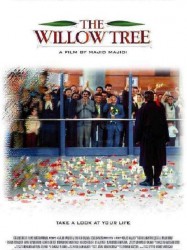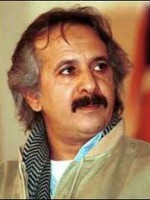Afarin Obeysi est une Actrice Iranienne née le 12 mars 1951 à Lahijan (Iran)

Afarin Obeysi (en persan آفرین عبیسی), née le 12 mars 1951 à Lahijan, est une actrice iranienne.
Source : Wikidata
Afarin Obeysi

- Infos
- Photos
- Meilleurs films
- Famille
- Personnages
- Récompenses
Le plus souvent avec
Filmographie de Afarin Obeysi (4 films)
Actrice

Taghato (2006)
, 1h41Origine Iran
Genres Drame
Acteurs Fatemah Motamed-Aria, Bahram Radan, Baran Kosari, Soroush Sehhat, Afarin Obeysi
Rôle mère de Behnaz et Mahssa
Note58%





Une gynécologue, le docteur Minoo Rahmani, dont le mari est décédé, aimerait se marier avec Dariush. Sa seule inquiétude est son fils Amir, qui fréquente souvent un jeune un peu délinquant, camarade de l’université, Pedram.

بید مجنون (2005)
, 1h36Réalisé par Majid Majidi
Origine Iran
Genres Drame
Acteurs Parviz Parastui, Roya Teymourian, Reza Naji, Leila Otadi, Afarin Obeysi
Note72%






Papier sans ligne (2002)
, 1h50Origine Iran
Genres Drame, Comédie
Acteurs Khosrow Shakibai, Hedieh Tehrani, Jamshid Mashayekhi, Jamileh Sheykhi, Niku Kheradmand, Afarin Obeysi
Rôle Soussan Joon
Note67%





Un couple, Jahangir (Khosro Shakibai) et Roya (Hedieh Tehrani) vivent avec leurs deux enfants, Shangul (Hanieh Moradi) et Mangul (Arian Matlabi), depuis des années. Ils mènent une vie plutôt monotone. Jahangir est loin d’être un mari modèle et tout à fait compréhensible pour Roya.

نيمه پنهان (2001)
, 1h43Réalisé par Tahmineh Milani
Origine Iran
Genres Drame
Acteurs Niki Karimi, Atila Pesyani, Afarin Obeysi
Note68%





The story is told through a manuscript which Fereshteh (Niki Karimi) leaves for her husband (Atila Pesiani) to read. This manuscript tells the story of her life when she was 18 years old and attending the University of Tehran. Fereshteh becomes interested in the fall of the Shah and other such political topics, and so joins a revolutionary, communist group. She gives out fliers, which was illegal as it was the Islamic Revolution period of 1978. Through the group, the young girl meets an older man, a pro-Mossadeq-era intellectual and magazine editor, Roozebeh (Mohammad Nikbin), who is intrigued by her “naive dedication to a noble cause". While government authorities inspect the university and streets of Tehran for revolutionary activists, Roozebeh presents Fereshteh with an opportunity to flee abroad to England. However, when Roozebeh’s wife finds out about the young lady, she informs her of Roozebeh’s family. Thus, when Fereshteh finds out about the intellectual’s wife and son, as well as the fact that she is a lookalike of his childhood sweetheart, she cuts all contact with him. She then marries her husband and does not inform him of her hidden past, only to reveal it to him when he tells her about the woman who is sentenced to death, whom he is interviewing for an appeal. Fereshteh does this in hopes that her husband will listen to the woman in a less critical and more understanding view, and to reveal to him her hidden half.
 Connexion
Connexion


